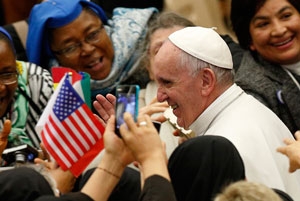Pope speaks to Religious at final event for Year of Consecrated Life
Vatican City, 1 February 2016 (VIS) – The Year of Consecrated Life, convoked by Pope Francis at the end of 2014 and which began with a prayer vigil in November of the same year in the Roman basilica of St. Mary Major, closes tomorrow with a solemn Mass celebrated by the Holy Father in St. Peter's Basilica. Along the way there have been events, seminars, chains of prayer in monasteries around the world, and an encounter between consecrated persons of different Christian confessions which, the Pontiff affirmed, is an initiative that it would be useful to continue.
This morning in the Paul VI Hall the Pope received in audience the participants in the Jubilee of Consecrated Life, the final event of the Year. He addressed some extemporaneous remarks to those present, setting aside the text previously prepared for the occasion, extensive extracts of which are reproduced below:
"One day Jesus, in His infinite mercy, addressed each one of us and told us personally, 'Come'. If we are here it is because we answered 'yes', at times with an adhesion full of enthusiasm and joy, at other times more difficult, perhaps uncertain", but always "with generosity, letting ourselves be guided along paths that we would not even have imagined", learning from Christ "the relationship with the Father, receiving His Spirit, learning to love the poor and sinners. We have followed Him together, learning service, acceptance, forgiveness and fraternal charity from Him. Our consecrated life has meaning because staying with Him and taking Him with us along the streets of the world, conforms us to Him, makes us Church, a gift for humanity".
"The Year that is coming to an end, but our commitment to staying faithful to the call we have received and to growing in love, giving and creativity, continues. Therefore I would like to leave you with three words. … The first word is prophecy, characteristic of consecrated life. … You are called, first and foremost, to proclaim with your life, before your words, the reality of God: to say God. If at times He is denied or marginalised or ignored, we must ask ourselves if perhaps we have not allowed His face to be transparent, instead showing our own. The face of God is that of a Father, 'merciful and gracious, slow to anger and abounding in steadfast love'".
The second word is closeness. "God, in Jesus, comes close to every man and every woman: He has shared in the joy of the spouses in Cana of Galilee and the anguish of the widow of Nain; He enters into the house of Jairus, touched by death, and the house of Bethany, perfumed with nard; He took upon Himself illness and suffering, to the point of giving His life in ransom. Following Christ means going where He went; taking upon onself, like the good Samaritan, the wounded we encounter along the road; going in search of the lost sheep. To be, like Jesus, close to the people; sharing their joys and pains, showing with our love the paternal face of God and the maternal caress of the Church. May no-one ever feel distant, detached, closed or barren. Each one of you is called upon to serve your brothers, following your own charism: with prayer, with catechesis, with teaching, with the care of the sick or the poor, announcing the Gospel, or performing the various works of mercy. The important thing is not to live for yourselves, just as Jesus did not live for Himself, but for the Father and for us".
Finally, hope: bearing witness to God and His merciful love, consecrated men and women can inspire hope in our humanity, "marked by so anguish and fear, and at times tempted to be discouraged. You can enable the renewing force of the beatitudes to be felt; of honesty and compassion, the value of goodness, of the simple life, essential and full of meaning. And you can nurture hope in the Church too. I think for example of ecumenical dialogue. The charismatic and prophetic witness of consecrated life in the variety of its forms can help us to acknowledge ourselves as more united and can promote full communion".
In your daily apostolate, do not let yourselves be conditioned by your age or number. What counts is the capacity to repeat the initial 'yes' to the call from Jesus that continues to be heard, in an ever new way, in every season of life. His call and our response keep our hope alive. Prophecy, closeness, hope. Living in this way, you will have joy in your heart, the distinctive sign of Jesus' followers and, in particular, of consecrated persons.

